Israel Strikes Syrian Army Assets After Rocket Launches
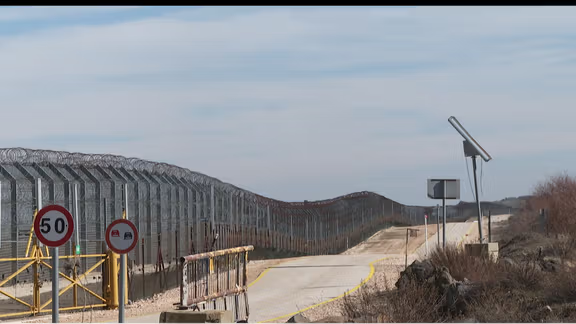
Israel's military said its jets struck Syrian army infrastructure and mortar launchers early on Wednesday as a response to rocket launches from Syria toward Israel.

Israel's military said its jets struck Syrian army infrastructure and mortar launchers early on Wednesday as a response to rocket launches from Syria toward Israel.
The military said it had identified two rocket launches from Syria that had landed in open areas late on Tuesday, and that it had responded with artillery fire at the sources of the launches.
In a further response, the military said its fighter jets "struck military infrastructure and mortar launchers belonging to the Syrian Army".
The military did not provide further details. It did not accuse Syria's army of firing the two rockets, which set off air raid sirens in the Israeli-occupied Golan Heights on Tuesday.
Israel has twice attacked the international airports in Syria's capital Damascus and its second largest city Aleppo since the October 7 Hamas terror raid into southern Israel. These attacks are believed to be aimed at preventing Iranian military aid from reaching Syria and ultimately the Lebanese Hezbollah.
Israel has been regularly attacking Iranian and Hezbollah targets in Syria since 2017 to prevent Iranian entrenchment and weapons transfers to the Lebanese militant group.
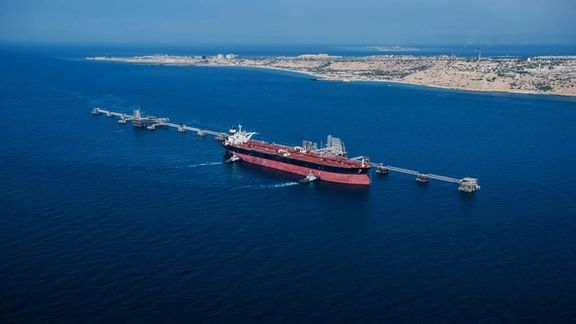
Despite a recent surge in oil exports, Iran is grappling with a large budget deficit partly due to inadequate oil income, raising questions about its real earnings.
Davoud Manzour, the head of Planning and Budget Organization (PBO), revealed on October 22 that the 7-month budget has only been realized by 70%, largely due to the unrealistic oil income estimates. While specific figures were not mentioned, Manzour cited discrepancies in both the projected oil prices and export volumes compared to the budget estimates.
As per this year’s government budget, Iran needs to export 1.5 million barrels per day (mb/d) of crude oil and gas condensate at an average price of $85 per barrel to balance its budget, which heavily depends on oil revenues. The government’s budget this year totals 22,630 trillion rial (approximately $45 billion at the free-market USD rate, with the government's share of total oil export revenues standing at 6,200 trillion rials ($12.5 billion), representing 42.5%.
Earlier, the Planning and Budget Organization had reported that only 42 percent of the expected oil revenues were realized from March 21-July 20, a figure that increased to 50 percent in August following higher oil exports. However, the realization of only 70 percent of the government budget over seven months implies a budget deficit of 3,960 trillion rials during that period. If this trend persists, it could culminate in a budget deficit of 6,788 trillion rials ($13.5 billion), marking the highest budget deficit in Iran's history.
The reasons for lower oil revenues
A notable point is that Manzour gave a much lower daily oil export figure than what has been mentioned by Reuters and others since August that claimed 1.85 million barrels per day. At this point the reason for the discrepancy is hard to pinpoint, but Iran’s revenue problems point to both lower volumes of exports and lower revenues.
Iran is delivering oil to Chinese independent and small refineries, called teapots, with 3-month delays in payments. Therefore, Iran’s March-September oil budget realization should be calculated based on January-July 2023 export data.
OPEC statistics indicate that during this period, the average Iranian oil price was $81/barrel, or $4 less than the estimate in the budget bill.
Though Iran’s oil exports soared to 1.5 mb/d in the summer, during January-July 2023, its average oil shipments were 1.2 mb/d, according to Kpler, commodity intelligence company.
On the other hand, about 6.6% or 80,000 b/day of Iranian exported oil was delivered to Syria in this period, a country that receives reportedly free oil from the Islamic Revolutionary Guard Corps, as Iran’s financial assistance to the Bashar Asad regime and regional proxies such as Hezbollah. Iran also delivered 22,000 b/d of gas condensate (ultralight oil) to Venezuela in this period to enable Caracas to boost its crude exports. The Venezuelan oil is too heavy for easy shipping, but when mixed with light Iranian oil, it becomes easier to ship.
Therefore, in total Iran exported only a little more than 1.1 mb/d to China in January-July 2023, about 400,000 b/d less than the budget bill estimate.
The costs for bypassing US sanctions
According to the Reuters and Bloomberg’s reports, Chinese teapots purchase Iranian oil with $10-$12 per barrel of discount.
On the other hand, international tanker tracking companies say a huge amount of Iranian oil is sold to China by middlemen and brokers, by ship-to-ship transfers in and the cargoes mostly are rebranded as Malaysian oil. The transfers take place in international waters, and apparently Malaysia does not interfere.
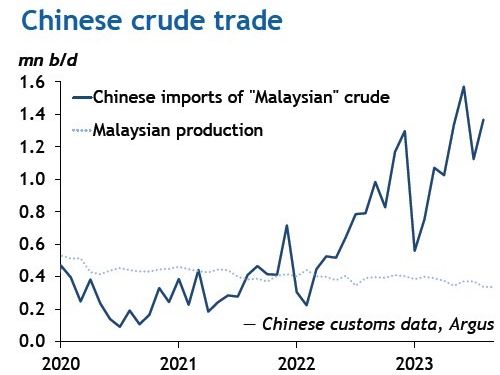
Therefore, Iran is not only giving a discount to end buyers, but also offers an undetermined amount of its profits to middlemen and tanker companies that are engaged in the diversionary oil export operations. The actual amount that Iran eventually earns could be closer to $40 per barrel than around $70.
On the other hand, Iran barters a part of its oil with Chinese goods.
The China Custom Administration’s statistics show a huge unbalanced non-oil trade with Iran. China has exported $7.493 billion goods to Iran in the first eight months of 2023, while its non-oil imports from Iran was only $3.287 billion.
The barter stems partly from US sanctions on Iran’s oil exports and the banking sector. Chinese buyers cannot easily transfer foreign currencies to Iran. The money needs to be laundered in different ways and in various countries in Asia and in the Persian Gulf.
While the Biden administration has not rigorously enforced US sanctions, thus permitting increased Iranian exports, there's a possibility that some of the optimistic estimates regarding Iran's oil revenues may not be entirely accurate. However, if the sanctions were enforced and Tehran could only sell a limited amount, such as the 500,000 barrels per day seen in 2019 and early 2020, the financial situation in the Islamic Republic would be considerably more dire today.
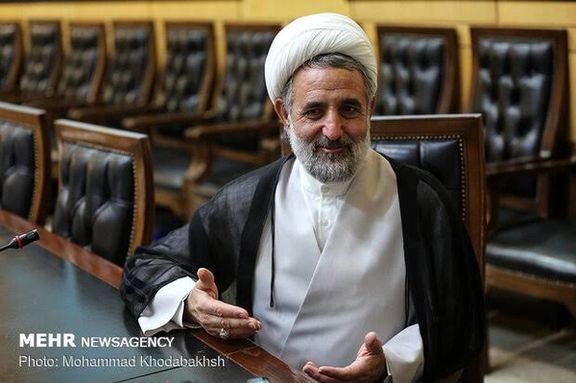
A parliamentary delegation from Iran left the opening ceremony of the Inter-Parliamentary Union after an anti-Hamas speech made by the union president.
The delegation, led by Mojtaba Zonnour, the deputy speaker of the parliament, attended the 147th session of the Inter-Parliamentary Union for the first time, with participants from over 120 countries.
Zonnour, a hardliner, previously served as the Supreme Leader's Deputy Representative to the Islamic Revolutionary Guard Corps (IRGC) and chaired the Nuclear Subcommittee of the National Security and Foreign Policy Committee in the Islamic Consultative Assembly until 2019.
At the beginning of the session, Duarte Pacheco, the President of the Inter-Parliamentary Union, delivered a speech in which he advocated the right of Israelis to defend themselves in recent events and referred to Palestinian groups as "terrorists." Following his statements, the Iranian parliamentary delegation left the opening ceremony in protest.
Designated as a State Sponsor of Terrorism in 1984, Iran continues its support for terrorist-related activities, including support for Hezbollah, Palestinian terror-designated groups in Gaza, and various militant groups in Iraq, Syria, Bahrain, and elsewhere throughout the Middle East.
Israel has vowed to wipe out the Hamas Islamist group that rules Gaza, after its gunmen burst through the barrier fence surrounding the enclave on October 7 and rampaged through Israeli towns and kibbutzes, killing 1,400 people.
Israel has since pounded Gaza from the air, imposed a siege and is preparing for a ground offensive. Palestinian authorities say around 5,000 people have been killed in the enclave. The UN says more than a million have been made homeless.

Four decades of propaganda by the Islamic Republic to garner support for its anti-Israeli campaign seems to have backfired as many Iranians want defeat for Hamas.
This heightened interest in the war's developments is driven by growing concerns about the potential for an escalation that could entangle Iran in a deadly conflict with Israel, and potentially even involve the United States.
The potential for escalation was revealed in remarks by US Secretary of State Antony Blinken who told the UN Security Council on Tuesday: "The United States does not seek conflict with Iran. We do not want this war to widen. But if Iran or its proxies attack US personnel anywhere, make no mistake: we will defend our people, we will defend our security -- swiftly and decisively."
Iranian lawmakers and military commanders have issued several threats to reassure the nation that they are in a strong position. However, these counter-threats have only served to heighten concerns about the uncertain future, especially if one of these threats were to materialize into military or terrorist actions.
Both in the actual world and on social media, Iranians have been showing strong opposition to the government's pro-Hamas and anti-Israeli narratives as well as unusually vocal support for Israel in the Gaza war. “Neither Gaza, nor Lebanon, I will sacrifice my life for Iran,” has been a popular slogan for protesters, students and even football fans.
However, pro-regime filmmaker Abolqasem Talebi even claimed this week that the slogan was created by Israel, ignoring the fact that it was first chanted several years before the Gaza war.
An article on the moderate news website Rouydad24 on Monday tried to discourage Iranians from chanting the slogan which is the lingering legacy of nationwide anti-government protests since 2018.
The article suggested that this "nationalistic" slogan had the potential to pave the way for "fascism." A brief examination of the website on Monday showed that it was part of a series of articles critical of patriotic and nationalist sentiments, which share significant similarities in the Persian language.
The website's concern about the slogan and its preaching that Iranians "must not chant any slogan they think will be helpful in their struggle against the government" has been particularly raised after spectators at Iranian stadiums chanted the slogan when confronted with government propaganda about the Palestinian issue, especially when it was intended to express support for Hamas.
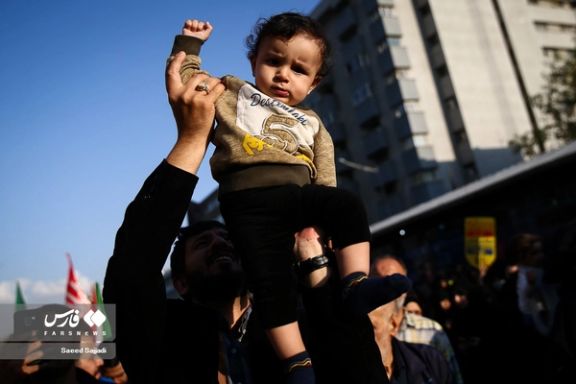
As the war in Gaza began, Iranians noticed brand new cars belonging to Palestinians who were leaving Gaza City in response to Israel's warning. Iranians shared images of these vehicles on social media, serving as a reminder that the government had been portraying Palestinians as impoverished for decades, all the while they were driving luxurious cars. This highlighted the stark contrast with Iranians who were struggling with high prices for poorly manufactured Iranian and Chinese vehicles.
In numerous videos from Gaza, Iranians also observed that Palestinians were living in homes and new apartment buildings that were much better than those in Iran.
Then came the news on social media about Hamas fighter being paid between $400 to $600 per month by the Iranian government, while current wages in Iran barely reach $200. The news may or may not be true, but given the current circumstances and the lack of fair and transparent information in Iranian media, people tend to believe even rumors.
The last blow came, once again on social media, and on satellite television, as footages showed Hamas Leader Ziad Nakhaleh shunning Shiism and telling Palestinians: "You can be a Shiite, but in this case you need to leave Hamas."
In recent weeks, Iranian stadiums have been venues for various anti-Hamas and anti-Palestinian incidents, as the government and its media often conflate Hamas with all of Palestine. Spectators at these events initially chanted disrespectful slogans when Palestinian flags were displayed in the stadium. In another instance, they created a disturbance by shouting and whistling when the loudspeakers called for a minute of silence to honor Palestinian "martyrs."
Meanwhile, numerous instances of Iranians expressing support for Israel have emerged on social media. Podcaster Sadegh Rohani pointed out in a tweet: "Israel has never been as popular in Iran as it is now. Even if there were Israel supporters before, they were not as outspoken as they are today."
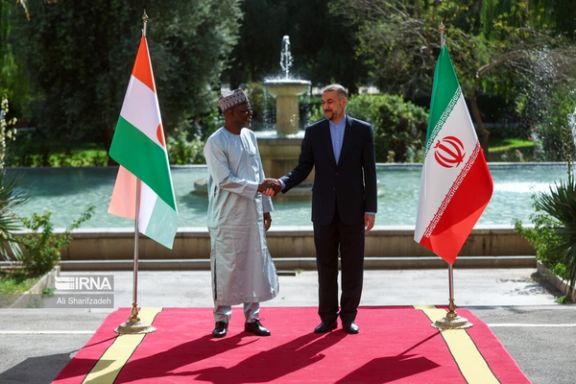
As Niger's Foreign Minister is in Tehran, the European Union has introduced sanctions targeting individuals and entities linked to the military junta that seized power in July.
Foreign policy chief Josep Borrell said, "The EU has from the very beginning condemned the coup d'état in Niger in the strongest terms."
The newly established framework empowers the EU to impose sanctions on those responsible for actions that it deems 'jeopardize Niger's peace, stability, and security, undermine its constitutional order, or involve severe violations of human rights and international humanitarian law'. In doing so, the EU seeks to align and reinforce the actions taken by the West African regional organization ECOWAS.
Bakary Yaou Sangare, the Foreign Minister of Niger's military government, was also in Tehran. On Monday, he met with Hossein Amir-Abdollahian, Iran's Foreign Minister.
State news agency IRNA described the ousted Nigerien president, Mohamed Bazoum, as being aligned with the West and noted that he was removed from office by the National Council for the Safeguard of the Homeland.
The junta in Niger opposes the presence of French forces in Africa and aligns itself with Russia. In September, Russian military officials made a visit to Africa, signaling Russia's efforts to bolster its role on the continent.
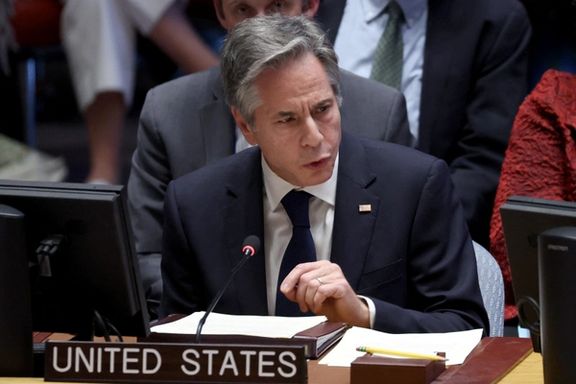
The United States said on Tuesday it does not seek conflict with Iran but warned that it would act decisively if Iran or its proxies attacks US personnel anywhere.
Secretary of State Antony Blinken who issued the warning spoke to the 15-member UN Security Council amid international fears the conflict between Israel and Iran-backed Palestinian Hamas militants in the Gaza Strip could spill over into a wider war, drawing in Lebanon's heavily armed Hezbollah that is also supported by Tehran.
"The United States does not seek conflict with Iran. We do not want this war to widen. But if Iran or its proxies attack US personnel anywhere, make no mistake: we will defend our people, we will defend our security - swiftly and decisively."
President Joe Biden on Monday ordered the Department of Defense to brace for more attacks by Iranian proxies and respond appropriately.
The US military is taking new steps to protect its troops in the Middle East as concerns mount about attacks by Iran-backed groups. The US has also sent warships and fighter aircraft to the region to try to deter Iran and Iran-backed groups, including two aircraft carriers.
Iran was due to address the Security Council meeting on the Middle East later Tuesday. The Iranian regime immediately congratulated Hamas on October 7 after its attack in southern Israel began and as news was emerging about a brutal massacre of civilians. Later, the government organized street celebration and officials have been issuing provocative statement in support of Hamas.
"We call on all member states to send a firm, united message to any state or non-state actor that is considering opening another front in this conflict against Israel or who may target Israel's partners, including the United States: don't. Don't throw fuel on the fire," Blinken said.
VIOLATIONS IN GAZA
UN Secretary-General Antonio Guterres pleaded on Tuesday for civilians to be protected in the war between Israel and Palestinian Hamas militants, voicing concern about "clear violations of international humanitarian law" in the Gaza Strip.
More than 700 Palestinians were killed in overnight Israeli air strikes, Gaza's health ministry said, the highest 24-hour death toll since Israel began a bombing campaign to crush Hamas militants who stunned the country with a deadly Oct. 7 attack.
Guterres told the Security Council that at a "crucial moment like this," it was vital to be clear that war has rules, starting with the fundamental principle of respecting and protecting civilians.
"It is important to also recognize the attacks by Hamas did not happen in a vacuum. The Palestinian people have been subjected to 56 years of suffocating occupation," Guterres said.
"But the grievances of the Palestinian people cannot justify the appalling attacks by Hamas. And those appalling attacks cannot justify the collective punishment of the Palestinian people," he said.
Israel's UN Ambassador Gilad Erdan described Guterres' speech as "shocking." In a post on X, formerly known as Twitter, he called on Guterres to immediately resign, while Israel's visiting Foreign Minister Eli Cohen said that he would no longer meet with Guterres later on Tuesday as planned.
"I will not meet with the UN secretary-general. After October 7 there is no room for a balanced approach. Hamas must be erased from the world!" Cohen wrote.
With reporting by Reuters